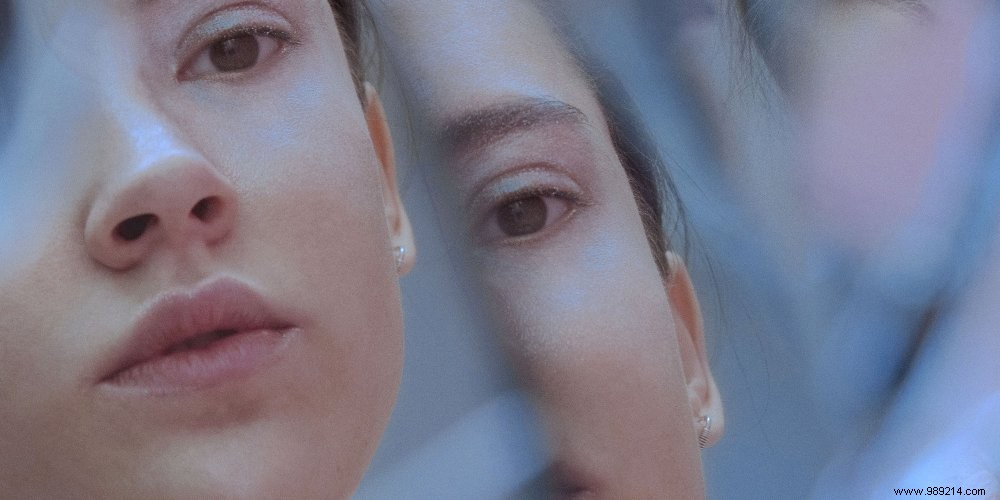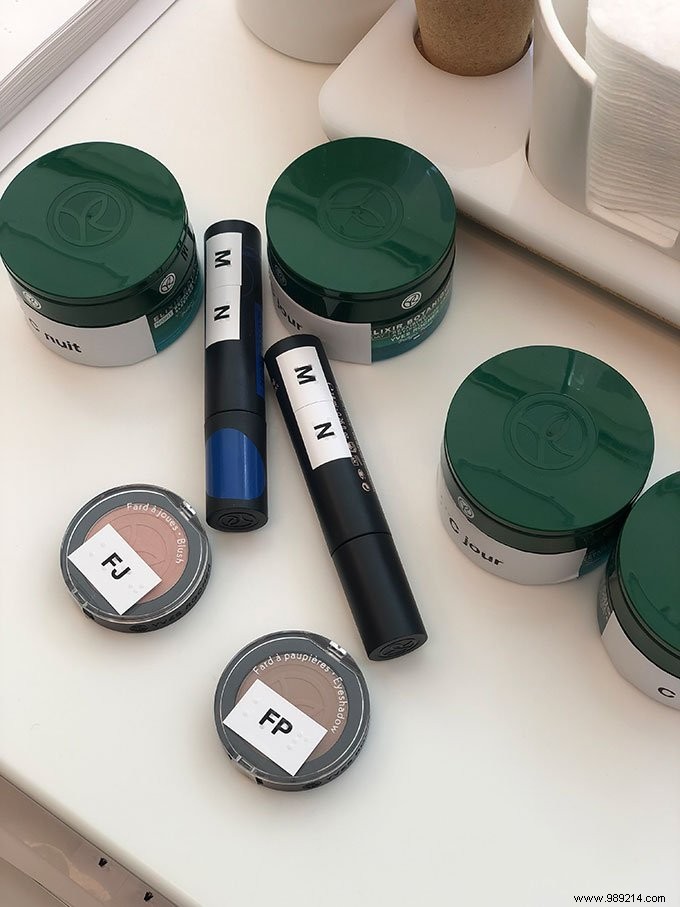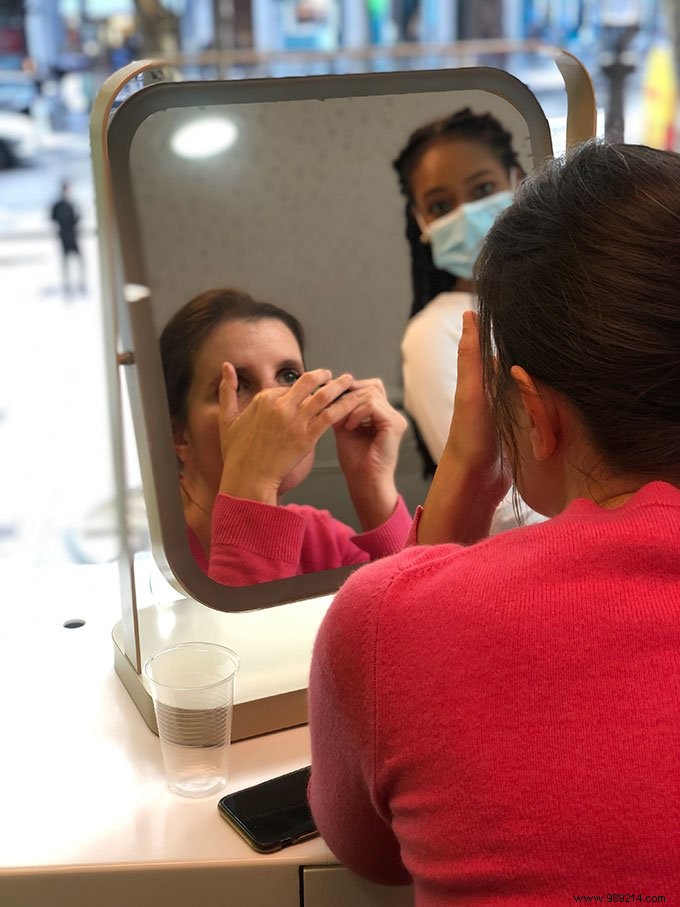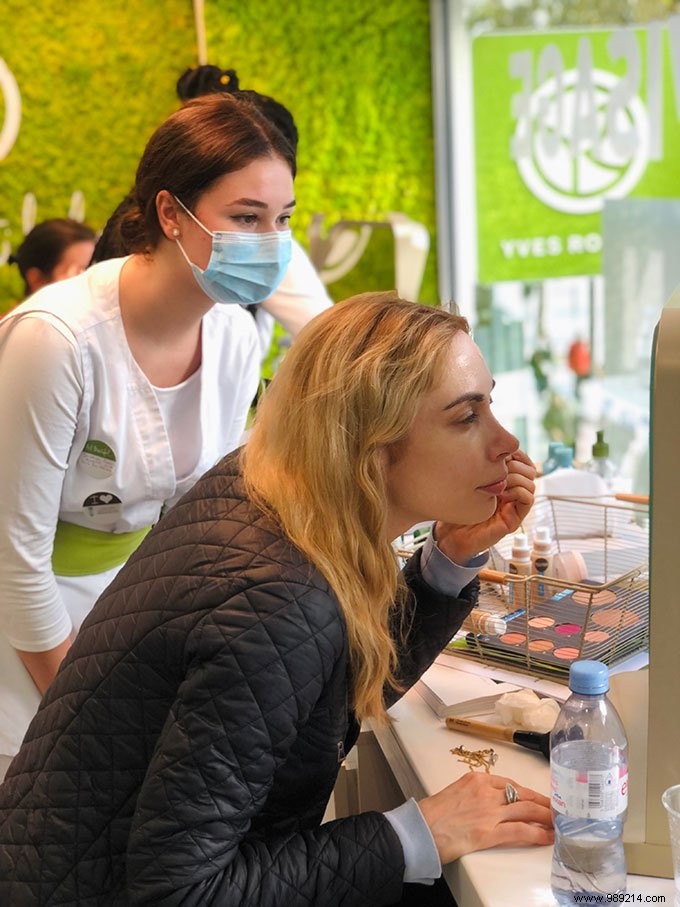 Applying mascara or lipstick:these gestures may seem quite banal. But when you suffer from visual impairment and cannot help yourself to the mirror, these acts of beauty lengthen the list of challenges to be met on a daily basis. Report during a make-up workshop dedicated to blind or visually impaired women.
Applying mascara or lipstick:these gestures may seem quite banal. But when you suffer from visual impairment and cannot help yourself to the mirror, these acts of beauty lengthen the list of challenges to be met on a daily basis. Report during a make-up workshop dedicated to blind or visually impaired women. At 25, Lucy Edwards is a beauty youtuber followed by more than 400,000 people around the world. One more, will you tell us? With the difference that this Briton became totally blind eight years ago, following a rare disease. Today, it is therefore deprived of this sense so precious to put on makeup that the young woman gives advice and tips on how to achieve a smoky eye perfect or to easily apply false eyelashes. Stunning, sometimes even amusing, Lucy Edwards' videos convey a positive image of disability to the people concerned, and far beyond.
Broadly reducing the complexity of visual impairments is also the objective of HandiCaPZero. Far from likes and screens, the French association facilitates the daily autonomy of blind and visually impaired people in various fields, including that of beauty. Since 2013, she has been organizing workshops in partnership with the Yves Rocher brand to teach women suffering from blindness how to apply make-up on their own. Baptized "Beauty without a mirror", these events allow you to (re)learn certain basic gestures:applying a cream, removing make-up, putting on foundation, mascara... To date, more than 300 women have already been able to benefit free of charge from these privileged and personalized moments, which take place in the heart of the Yves Rocher boutiques.
Video of the day:“Organizing make-up workshops in associations is good, but it remains compartmentalized, explains Stéphanie Cuppini, communication officer for HandiCaPZero. By organizing these events in stores, we are really in the process of inclusion and trivialization. he idea is for the shop to be open to everyone, so that a woman with a visual impairment can come and have her make-up done whenever she wants, like all the other women. So that after the workshop, she also feels capable of come back on her own, to do her shopping and ask for advice without any embarrassment".
Marie Claire was able to attend one of them.
Caroline is one of the women taking part in the “Beauty without mirror” workshop this afternoon, in the Yves Rocher boutique on the Champs-Elysées. Behind her impeccably dressed appearance, it's hard to imagine that this Parisian was affected by age-related macular degeneration at just 13 years old. Occurring overnight, this pathology corresponds to a degradation of part of the retina, leading to the loss of central vision. Which means that Caroline only sees the periphery. The images she perceives are not clear, she only distinguishes shapes and colors, constantly confused with small black and white dots. However, Caroline has not given up on coquetry, quite the contrary. "I wear makeup every day, I'm a beauty addict" , she laughs.
Endowed with a character that leaves little room for lamentations, she did not ask herself the question of whether she should wear makeup or not. Rather, she wondered how to adapt this ritual to her disability. The answer ? "I go for the most practical and the least risky to be sure of myself," she says. Because she admits, "there is always the fear of looking like a clown". So on a daily basis, she favors natural colors and easy-to-apply textures to avoid lines. Before major events (Caroline is a columnist and often appears in the media, editor's note) she still asks for the validation of her relatives, "but the big misses are rare", she assures.
Like all visually impaired or blind people, Caroline has developed other senses. Without her sight to guide her, it is her memory and her touch that she trusts. "I do my make-up by marks and memorization, she explains. I know that it takes so much product, that it has to be applied in such a way, and in such a place."
As reliable as his memories and his hands may be, unfortunately there are times when that just isn't enough. We do not realize it when blindness is a distant subject, but the packaging of cosmetics is very often standardized. So how can you distinguish an eyeshadow from a blush when all the boxes look alike?
“I categorize my beauty products, putting them by type, explains Caroline. For example, I know exactly where I put my lipsticks, the pink shades on one side, the peach shades on the other. I sometimes get it wrong when I'm in a hurry, but overall it's a system that works!"
In order to avoid user errors, the HandiCaPZero association has developed labels in Braille and in enlarged characters, to be stuck on each bottle to easily identify the different products. A simple, practical and clever solution, developed from testimonials from participants after the first workshops.

Labels in braille and in large characters © DR
Of course, not all blind and visually impaired women have Caroline's innate appetite for the world of beauty. Tatiana, who is also attending the workshop today, has suffered from retinal detachment since she was 15. She wears makeup occasionally, mostly out of professional obligation.
For a long time, she refused the right to make up her beautiful green eyes. "It was not an area that I dared to highlight," she says. Until the day she took part in her first "Beauty without mirror" workshop and an Yves Rocher adviser gave her confidence:"Your eyes are not damaged so you can completely overcome this preconception and enhance your look. "

Today, after a few years of training, she applies her mascara with a masterful hand, manages to flesh out her line of eyebrows with a single pencil stroke and even allows herself golden eyeshadow from time to time. . But some gestures can still intimidate him. Like the one she is learning today:apply a green concealer to her redness. "I can't see the colors at all so I can't know if there will be traces of green on my face or not," she worries.
Emmanuelle, the makeup artist Yves Rocher who takes care of her, uses the needle with a gentleness and a pedagogy that spontaneously removes all barriers:quantity of product, application gestures... Thanks to these benevolent indications, Tatiana succeeds hands down this new challenge:no green demarcation on the horizon, her complexion is perfectly even.
Next door, Shainese takes care of Caroline. This is the first time that she has made up an invalid woman. "I was a little stressed before the workshop because I was afraid of being clumsy, of not having the right words or the right gestures", confesses the young woman. Before being reassured by her partner:"You are doing very well! As always, there is nothing better than naturalness and authenticity."
Finally very comfortable, Shainese continues on her way by taking the time to explain each of the makeup steps in detail:"To properly apply your highlighter, locate the top of your cheekbones while smiling, apply a little material on the the most domed then blend delicately with your finger while pulling upwards." Neither one nor two, Caroline runs:"What does it give?" she launches in stride. "That's perfect," Shainese replies, once again stunned by Caroline's ease.
Futile at first glance, makeup turns out to be more than useful when it becomes a way to release your emotions. "The workshops can bring out various feelings, testifies Stéphanie Cuppini of HandiCaPZero. There are very strong, very moving moments, laughter, tears, awareness, psychological releases. There are women who have completely given up to their femininity because of their disability and who suddenly regain their self-confidence thanks to these workshops, realizing that they can be autonomous and do their own make-up."
And to add:"At the end of the workshops, we always ask the participants how they feel. There is a very simple sentence that comes up often, it's 'I think I'm beautiful'. It seems that they didn't allow themselves to use that word before. This kind of reaction is a reward for everyone!"
"Mastering the techniques and being able to do my own make-up on a daily basis helps me enormously to have confidence in myself", continues Caroline. Like a kind of therapy, a way to gain confidence and take matters into your own hands, coquetry allows you to soften external looks and assert your right to be a woman "like the others".

"I appreciate being able to wear makeup, but my beauty goes beyond that, concludes Tatiana. It also and above all passes through the acceptance of who I am naturally, without make-up. It's everyday work , of a lifetime, which ultimately concerns all women, disabled or not". How can we not share his thoughts and take our hats off to him?
Stopped during the period of the coronavirus epidemic, the “Beauty without mirror” workshops are resuming in several cities in France. The next workshops will take place in Yves Rocher boutiques in Nice Jean Médecin (November 9, 2021), Rennes Bastard (November 18, 2021), and Paris Champs Elysées (December 14, 2021).
Read: Blind makeup by Véronique Barreau.